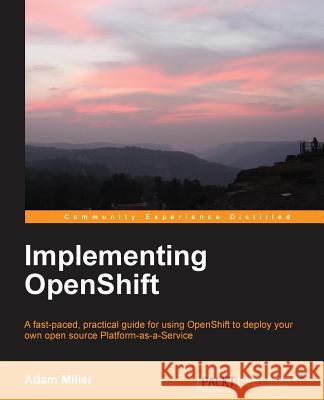Implementing Openshift » książka
Implementing Openshift
ISBN-13: 9781782164722 / Angielski / Miękka / 2013 / 116 str.
Gone are the days of having to provision hardware, deploy, and manage an entire environment just to write code for the next big idea, project, or custom web application. A Platform-as-a-Service cloud aims to fulfill this need, allowing developers to work more efficiently as well as allowing DevOps teams to spend less time fulfilling requests for these environments. Join us as we move into the future with OpenShift. Implementing OpenShift will walk the reader through how to easily develop and deploy upon an open source OpenShift Platform-as-a-Service. We will then discuss the architecture of the platform so that users have some insight into the inner workings of the environment. We will then take a step away from the user aspect and cover DevOps topics so that we can perform the deployment of our very own open source Platform-as-a-Service using the upstream OpenShift Origin code base. Developers are no longer in need of provisioning full-scale development environments by provisioning servers, installing and configuring software, and maintaining infrastructure just to write software. This book will show you how developers can move out of this archaic mindset and into the future utilizing OpenShift Platform-as-a-Service technologies, breaking away from the marketing jargon and into the technology that allows developers to get work done. This book also delves into the realm of DevOps, allowing you to run your own environment to support your development teams more efficiently. This book will show you how the OpenShift Platform-as-a-Service can redefine the way web application developers work by providing the building blocks upon which they are able to create their next big idea. From there, the reader will progress through the OpenShift architecture and on to a brisk automated deployment using DevOps technologies. You will learn everything you need to know in order to use OpenShift to develop and deploy applications in the cloud as well as how to deploy your very own OpenShift Origin-based Platform-as-a-Service cloud.











